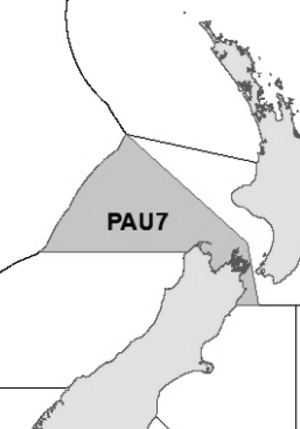- Fisheries Management in New Zealand
- Species
- Customary
- Aotea Great Barrier Temporary Closure 2023
- Astrolabe Reef s186A closure 2016
- Coromandel East temporary closure 2021
- Coromandel East temporary closure 2024
- Hauraki Gulf temporary closures 2024
- Kauaetangohia Mātaitai
- Maunganui Bay temporary closure
- Napier Reef temporary closure 2025
- Napier Reef temporary closure 2023
- Ōhiwa Harbour temporary closure 2024
- Ōmāui Mātaitai 2019-20
- Ruapuke Island Mātaitai 2024
- Taranaki temporary closure 2024
- Taranaki temporary closure 2022
- Tautuku Mātaitai 2019-21
- Te Māta temporary closure
- Tutukaka – Ngunguru temporary closure 2023
- Umupuia temporary closure
- Waiheke temporary closure 2021-24
- Waimārama temporary closure 2024
- Waimārama temporary closure 2020 -22
- Whale Island mātaitai 2024
- Whangaroa temporary closure 2021
- Fisheries policy & reform
- Fisheries plans
- Legislation and reviews
- Regulatory reviews
- Aggregation limits application 2024
- Aggregation excess limits EMA KAH 2020
- Crayfish Aggregation limit exemption 2016
- Deemed value review 2016
- Deemed value review 2021
- Deemed value review 2022
- Finfish bag limits review 2021
- Fiordland amateur regulations review 2022
- Papamoa Beach bylaw review 2018
- Seabird mitigation measures 2023
- Technical change proposals 2022
- Submissions by year
- North & South Islands submissions
- 2025 Submissions
- 2024 Submissions
- Aggregation limits application 2024
- Blue cod Marlborough Sounds review 2024
- Coromandel East temporary closure 2024
- Crayfish 1 management review 2024
- Crayfish 3 TAC review 2024
- Crayfish 7 and 8 review 2024
- Exception review for predated HMS 2024
- Extend coastal permits bill 2024
- Fast Track Approvals Bill 2024
- Hauraki Gulf temporary closures 2024
- Jack mackerel pilchard kingfish review 2024
- Kaikōura Pāua 3A TAC review 2024
- Kaikōura pāua reopening 2024
- Kina 1 review 2024
- Kina 3 TAC review 2024
- Kingfish 3 TAC review 2024
- Ōhiwa Harbour temporary closure 2024
- Pacific bluefin landing review 2024
- Ruapuke Island Mātaitai 2024
- Snapper flatfish elephantfish 7 review 2024
- Snapper Rig John dory 2 review 2024
- Snapper 8 TAC review 2024
- Southern bluefin landing review 2024
- Southern bluefin TAC review 2024
- Taranaki temporary closure 2024
- Waikato Regional Coastal Plan 2022-25
- Waimārama temporary closure 2024
- Whale Island mātaitai 2024
- 2023 submissions
- Aotea Great Barrier Temporary Closure 2023
- Coromandel scallop closure review 2023
- Crayfish 1 TAC review 2023
- Deemed values review SNA 2023
- Gurnard 3 TAC review 2023
- Industry Transformation Plan 2023
- Hauraki Gulf Fisheries Plan 2023
- Hauraki Gulf trawl corridors 2023-25
- Kina 1 TAC review 2023
- Kina dredging Tory Channel review 2023
- Marine Protection Bill 2023–25
- Napier Reef temporary closure 2023
- Pāua 2 Fisheries Plan 2023-24
- Pāua 2 TAC review 2023
- Red cod land-all catch review 2023
- Seabed mining inquiry 2023
- Seabird mitigation measures 2023
- Trevally 2 TAC review 2023
- Tutukaka – Ngunguru temporary closure 2023
- Waikato Regional Coastal Plan 2022-25
- 2022 submissions
- Blue cod 7 TAC review 2022
- Crayfish 1, 7 & 8 TAC review 2022
- Deemed value review 2022
- Fiordland amateur regulations review 2022
- Fisheries Amendment Bill 2022
- FMA 7 TAC review 2022
- Gurnard 3 TAC review 2022
- Habitats of significance 2022
- Hākaimangō-Matiatia (Northwest Waiheke) Marine Reserve
- Hāpuku Bass 7 & 8 TAC Review 2022/23
- Hauraki Gulf Marine Protected Areas 2022
- Kaikōura pāua reopening 2022
- Maunganui Bay temporary closure
- Northland area closure proposals 2022
- Pāua 5 Draft Fisheries Plan
- Rig 3 TAC review 2022
- Northland & Coromandel Scallop TAC Review 2022
- Tarakihi east coast TAC review 2022
- Taranaki temporary closure 2022
- Technical change proposals 2022
- Te Māta closure application
- Waikato Region Coastal Plan 2022
- Waimārama temporary closure 2020 -22
- Umupuia temporary closure 2008-2024
- 2021 submissions
- Blue cod 3 TAC review 2021
- Cameras on boats 2021
- Clive River dredging 2021
- Coromandel East temporary closure 2021
- Crayfish 1, 3, 4, 5 & Packhorse TAC review 2021
- Elephant fish 7 TAC review 2021
- Finfish bag limits review 2021
- Flatfish 2 TAC review 2021
- Gurnard 1 TAC review 2021
- Hāpuku-Bass 1 & 2 TAC review 2021
- Kaikōura pāua fishery reopening 2021
- Kingfish 8 Deemed value review 2021
- Snapper 8 TAC review 2021
- Southern bluefin tuna TAC review 2021
- Tarakihi east coast TAC review 2021
- Waiheke temporary closure 2021-24
- Whangaroa temporary closure 2021
- Yellow-eyed mullet 9 TAC review 2021
- 2020 submissions
- Aggregation limits kahawai, jack mackerel 2020
- Blue cod 5 TAC review 2020
- Crayfish 1, 3, 4, 7 & 8 TAC review 2020
- Crayfish ACE carry forward 2020
- Gurnard 7 TAC review 2020
- Kingfish 2, 3, 7 & 8 TAC review. July 2020
- Maunganui Bay temporary closure
- National Finfish Fisheries Plan 2019-20
- National Rock Lobster Management Group review 2020
- Northland scallop TAC review 2020
- Pāua 3 subdivision 2020
- Pōrae 1 TAC review 2020
- Sea Change Marine Spatial Plan 2014-21
- Snapper 7 TAC review 2020
- South Island trawl species review 2020
- Tautuku Mātaitai application 2019-21
- Waimārama temporary closure 2020 -22
- 2019 submissions
- 2018 Submissions
- 2017 Submissions
- 2016 Submissions
- Astrolabe Reef closure application
- Bluenose management review
- Coromandel Scallops
- Crayfish 3 Gisborne
- Crayfish management 2016
- Deemed values 2016
- Jack mackerel 3 management review
- John dory 7 management review
- Paua 7 South Island
- Quota aggregation limits exemption
- Scallops (SCA7) management 2
- Seabed mining Taranaki 2016
- Snapper 7 management review
- Surf Clam 7 review 2016
- 2015 Submissions
- 2014 Submissions
- 2013 Submissions
- 2012 Submissions
- 2011 Submissions
- 2010 Submissions
- 2009 Submissions
- 2008 Submissions
- 2007 Submissions
- Regional issues
- Aquaculture
- Bay of Plenty
- Hauraki Gulf
- Coromandel East temporary closure 2021
- Hākaimangō-Matiatia (Northwest Waiheke) Marine Reserve 2022
- Hauraki Gulf Fisheries Plan 2023
- Hauraki Gulf Marine Protected Areas 2022
- Hauraki Gulf trawl corridors 2023-25
- Marine Protection Bill 2023–25
- Ponui mussel farm proposal
- Sea Change Marine Spatial Plan 2014-21
- Te Māta temporary closure
- Umupuia temporary closure 2008-2024
- Coromandel scallop closure review 2023
- Waiheke temporary closure 2021-24
- Waikato Region Coastal Plan 2022
- Waikato Regional Coastal Plan 2022-25
- Marlborough and Tasman
- Northland
- Southland and Otago
- Marine protection
- RMA
- Research and reports
- Document Index
- Document Search
Paua 7 South Island
Introduction
On June 10th the Ministry for Primary Industries (MPI) advised they were consulting on options for the future management of the Paua 7 fishery at the top, east and west coast of the South Island.
MPI has proposed three options, one being the status quo, the other two require substantial cuts to the commercial catch limit. Submission deadline is 11 July 2016.
NZSFC response
The New Zealand Sport Fishing Council will be submitting a response to the proposals. We again object to the short consultation timeframes offered by the Ministry. This time we had 21 working days, which is inadequate for us as a volunteer organisation to firstly understand the proposals, prepare a response, and then talk with affected members and supporters in the Southern regions.
To aid the discussions the Council has compiled a Preliminary View on Paua 7 outlining the first issues we identified as needing attention. A submission is underway and will be posted online after it has been sent to the Ministry.
What follows is our record of the process and the Council’s response. As other relevant documents are made available they will be posted online.
Click on the right hand image to download the document. Most recent activity is at the top of the list.
Minister’s decision. Paua 7 fishery (PAU7). 8 September 2016
Nathan Guy, the Ministry for Primary Industries, has followed MPI’s advice and approved a 50% reduction in the Total Allowable Commercial Catch (TACC). The NZSFC remains concerned that low abundance is denying reasonable public access to this important fishery. [Caution: File size – 8MB]
MPI Final Advice Paper. Paua 7 fishery (PAU7). August 2016
This Ministry for Primary Industries Decision Document includes MPI’s final advice and recommendations for the future management of 5 deepwater and 20 inshore fish stocks. It also includes recommendations on the proposed amendments to deemed value rates for selected fish stocks.
The Paua 7 discussion and recommendations are on pages 123 to 148.
Submissions. Paua 7 fishery (PAU7). July 2016
The Ministry for Primary Industries received 11 submissions in response to their three proposed options for the future management of Paua 7. Of those submissions 7 were from commercial and/or iwi interests supporting an alternative Option two. Option 2 was a 40% reduction of the TACC. Three submissions from recreational fishing interests supported Option 3, whic was a 60% reduction of the TACC. One submission supported unspecified reductions.
This document is a compilation of all submissions to the June-July management process reviewing multiple species and stocks. [Caution: File size – 18MB]
NZSFC Submission. Paua 7 proposals. 9 July 2016
The New Zealand Sport Fishing Council submits in support of the Ministry’s and paua industry’s call for cuts to commercial harvesting to rebuild the Paua 7 fish stock. The Paua 7 stock has been below target stock size for nearly 20 years. Low abundance is impacting on recreational harvest. The NZSFC objects to shelving. There is no statutory support for shelving, the Minister is responsible for rebuilding and maintaining Paua 7 in an abundant state.
NZSFC Preliminary view. Paua 7 proposals. 27 June 2016
The New Zealand Sport Fishing Council has reviewed the Ministry’s proposals for the future management of PAU7 and recommend support for MPI’s option 3, to reduce the Total Allowable Catch (TAC) from 220 tonnes to 115 tonnes. Option 3 also requires a 60% cut to the Total Allowable Commercial Catch (TACC), from 187 tonnes to 75 tonnes. The Council rejects any notion that shelving of catching rights is appropriate given the depleted state of the fishery.
MPI proposals. Paua 7 fishery (PAU7). 10 June 2016
The Ministry for Primary Industries (MPI) proposes three options for the future management of Paua 7. Option one is the status quo. Option 2 is 40% reduction of the TACC. Option 3 is a 60% reduction of the TACC. Both the Ministry and paua industry have been concerned about the declining stock and low catch rates. MPI advise there is a need to reduce the level of catch in Paua 7 because the stock is now below the “soft limit”, meaning it is estimated to be about 18% of its original, unfished stock size. A long way to go to get back to the default minimum of 40%.
MPI letter. Paua 7 proposals. 8 June 2016
The Ministry for Primary Industries (MPI) advises it is consulting on management measures for a range of fish stocks, including Paua 7. Submission deadline is 11 July, leaving us 21 working days to read the proposals, do our research, consult with our members and supporters and write a submission. From our perspective that timeframe is inadequate.
MPI plenary. Paua 7 plenary report. May 2015
This plenary is the Ministry’s summary of the Paua 7 fishery. This includes stock status information and data of historic and estimated catches from the fishery. This is the Ministry’s “bible” of information on this fish stock.